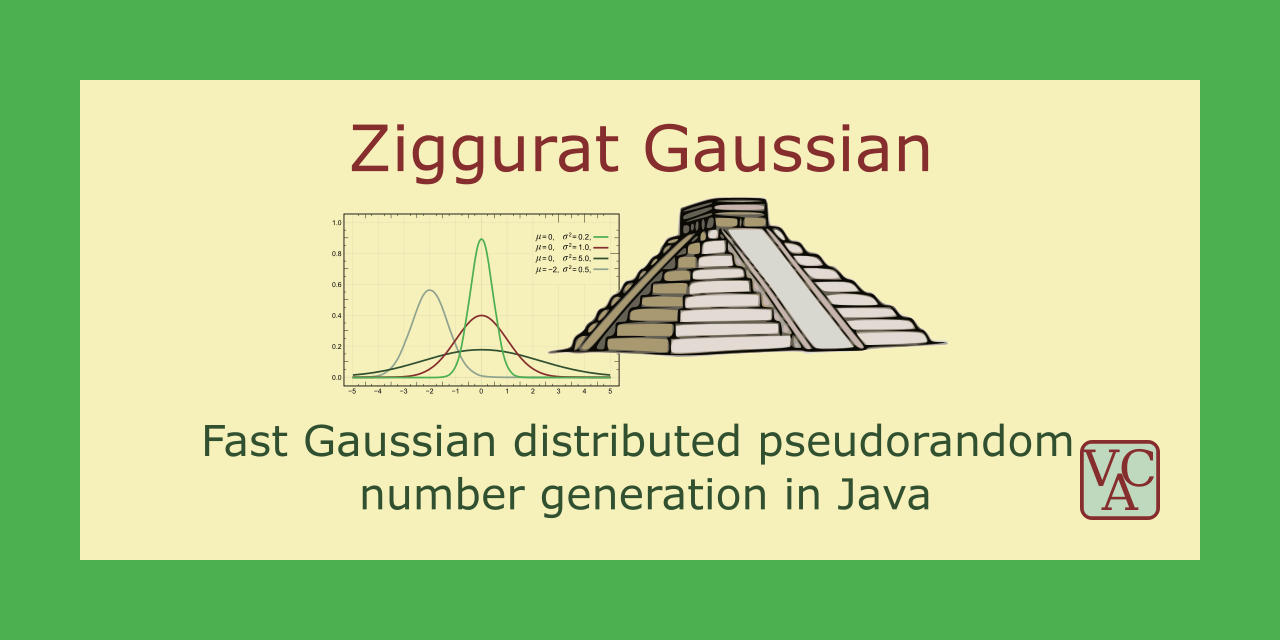Copyright (C) 2015, 2017-2023 Vincent A. Cicirello.
| Packages and Releases |   |
|---|---|
| Build Status | |
| JaCoCo Test Coverage | |
| Security | |
| DOI | |
| Other Information |   |
| Support |    |
This repository contains a Java implementation of the Ziggurat algorithm for generating Gaussian distributed pseudorandom numbers. The Ziggurat algorithm is significantly faster than the more commonly encountered Polar method, and has some other desirable statistical properties. The ZigguratGaussian class is a Java port of the GNU Scientific Library's C implementation (Voss, 2005) of the Ziggurat method. In porting to Java, we have made several optimizations, the details of which can be found in the source code comments, which highlights any differences between this Java implementation and the C implementation on which it is based.
This Java implementation originated as part of an effort to speed up the runtime of a parallel genetic algorithm (PGA). The PGA in question evolved its control parameters (i.e., crossover and mutation rates, etc) using Gaussian mutation. The only Gaussian implementation within the Java API is the polar method (nextGaussian method of the Random and ThreadLocalRandom classes, however the polar method is quite slow relative to other newer available alternatives, such as the Ziggurat method.
You can find some experimental data comparing the performance of a sequential genetic algorithm (GA) using this implementation of the Ziggurat method for Gaussian mutation vs using the more common polar method, as well as experimental data for the same comparison but with a PGA, in the following paper:
V. A. Cicirello. Impact of Random Number Generation on Parallel Genetic Algorithms. Proceedings of the Thirty-First International Florida Artificial Intelligence Research Society Conference, pages 2-7. AAAI Press, May 2018.
See the following articles for detailed description of the Ziggurat algorithm itself, as well as additional experimental data:
- G. Marsaglia and W. W. Tsang. The ziggurat method for generating random variables. Journal of Statistical Software. 5(1):1–7, 2000.
- P. H. W. Leong, G. Zhang, D. Lee, W. Luk, and J. Villasenor. A Comment on the Implementation of the Ziggurat Method. Journal of Statistical Software. 12(7):1–4, 2005.
- J. Voss. The Ziggurat Method for Generating Gaussian Random Numbers. GSL: GNU Scientific Library. 2005.
See ρμ for Expanded Functionality
The entirety of this library has been absorbed by ρμ, a Java library of Randomization enHancements and Other Math Utilities, which includes additional enhanced random number generation, among other related functionality. However, ρμ requires Java 17+, whereas this Ziggurat implementation supports Java 11+.
The library uses Semantic Versioning with version numbers of the form: MAJOR.MINOR.PATCH, where differences in MAJOR correspond to incompatible API changes, differences in MINOR correspond to introduction of backwards compatible new functionality, and PATCH corresponds to backwards compatible bug fixes.
The jars of the library, distributed via Maven Central, GitHub Packages, and GitHub Releases, are built with OpenJDK 17 but for a target of Java 11.
Prebuilt artifacts are regularly published to Maven Central and GitHub Packages. In most cases, you'll want to use Maven Central. Releases are published to GitHub Packages mainly as a fall-back in the unlikely scenario that Maven Central is unavailable.
Add this to the dependencies section of your pom.xml, replacing the version number with the version that you want to use.
<dependency>
<groupId>org.cicirello</groupId>
<artifactId>ziggurat</artifactId>
<version>1.0.4</version>
</dependency>If you'd prefer to import from GitHub Packages, rather than Maven Central, then: (1) add the dependency as indicated in previous section above, and (2) add the following to the repositories section of your pom.xml:
<repository>
<id>github</id>
<name>GitHub cicirello Apache Maven Packages</name>
<url>https://maven.pkg.github.com/cicirello/ZigguratGaussian</url>
</repository>Note that GitHub Packages requires authenticating to GitHub.
If you don't use a dependency manager that supports importing from Maven Central, or if you simply prefer to download manually, prebuilt jars are also attached to each GitHub Release.
If you want to build from the source, then execute mvn package at the root
of the repository. The library should build with Java 11+.
To include generation of a code coverage report during the build,
execute mvn package -Pcoverage at the root of the repository to
enable a Maven profile that executes JaCoCo during the test phase.
To run all static analysis tools (i.e., SpotBugs, Find Security Bugs,
refactor-first), execute mvn package -Panalysis to enable a Maven
profile that executes the various static analysis tools that we are
using. The SpotBugs html report will be found in the target directory,
or you can use the SpotBugs GUI with: mvn spotbugs:gui -Panalysis. The
refactor-first report will be found in the target/site directory.
To run all of the above: mvn package -P "analysis,coverage".
The example programs in this repository are licensed under the GNU General Public License 3.0.

